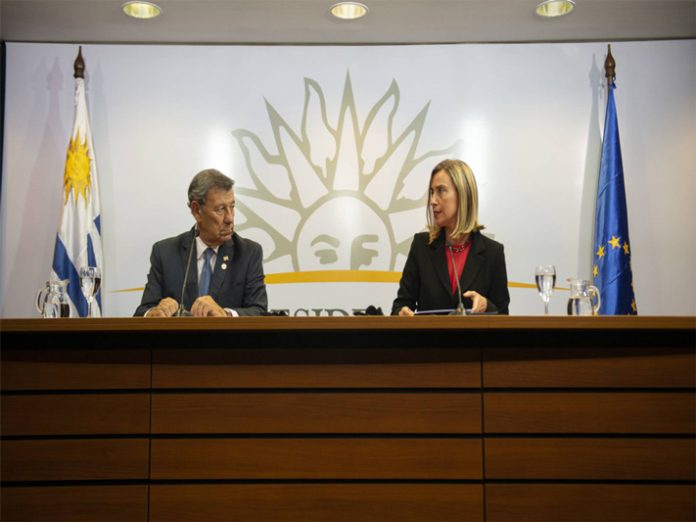
International Contact Group wants to find “peaceful, political, democratic and Venezuelan solution”. For the Brazilian chancellor, Ernesto Araújo, this “is not a useful initiative”.
Enric GONZÁLEZ
The European initiative to help solve the Venezuelan crisis has been launched. The so-called international Contact Group met on Thursday for the first time in Montevideo and announced its purpose of helping to find “a peaceful, political, democratic and Venezuelan solution.” The initial prospects were not the best: Bolivia, one of the few Latin American members of the group, refused to sign the final communiqué. Mexico remained on the sidelines. And Uruguay, co-chair of the group with the EU, played with two decks: it remains in the initiative of Montevideo, with Mexico and the countries of the Caribbean.
At this time, there are three international proposals on Venezuela: that of the Lima group (the main countries of Latin America and Canada), that of the contact group (of which Spain participates) and the initiative of Montevideo. Beyond the United States, of course. They all require presidential elections. Even though that’s not clear. Uruguayan foreign Minister Rodolfo Nin Novoa, who reported on the results of the Contact group meeting, said that a mandatory condition to solve the Venezuelan problem is “the establishment of guarantees for an electoral process Fair “and the convocation of elections. Minutes later, he said that if the parties to the conflict in Venezuela agreed not to convene these elections, there would be no place to carry them out.
“The Uruguayan minister spoke first as a member of our group and then as a member of the Montevideo Initiative,” explained Josep Borrell, Spanish foreign minister. That gives an idea of how fluid and uncertain things are. For Borrell, it is essential to have a quick convocation of early elections “by Juan Guaidó”, which Spain recognizes as interim president. For Bolivia, that’s not so clear. Nor for Mexico, which, with Uruguay, prefers to stick to a coordinated management with the United Nations. The Lima group, which includes the main continental powers (such as Brazil, Argentina and Canada), except the United States and Mexico, is more aligned with Washington. Donald Trump says there’s nothing left to negotiate with the Maduro regime.
It seems clear that the contact group sponsored by the European Union does not want to press, but to help. Its first measure will be the opening in Caracas of a “technical office” that aims to facilitate the arrival of humanitarian aid and, in the words of Federica Mogherini, head of European diplomacy, “provide contacts, so we call ourselves Contact group”. Mogherini hopes that during the next few weeks new countries will join the group, although at the moment there are no signs of it.
For the Brazilian chancellor, Ernesto Araújo, this “is not a useful initiative”. “It is part of the premise of equality, between the legitimate government of Guaidó and the dictatorship of Maduro. As an example of the past, this initiative should not prosper, only delay the dictatorship of Maduro and create doubts about the process, “said the chancellor in a press conference at the Embassy of Brazil in Washington. “We don’t think it’s that way. It is for the full recognition of President Juan Guaidó. ”
Three months
The contact group will last three months, no longer, to avoid becoming an instrument that favors the dilatory tactics of the Chavista regime. In a few weeks, you’ll hold a new meeting. “In 90 days, we will know if we have any results,” said Mogherini, who admitted to understanding “the skepticism” that some countries received the initiative.
In essence, the European Union, together with Ecuador, Costa Rica, Uruguay (which is also part of another group), Bolivia (which did not sign the original document) and Mexico — as an observer country — tries to remain on the sidelines of the internal political struggle in Venezuela. He wants to avoid “politicize” the hypothetical distribution of humanitarian aid — which Maduro rejects for the time being — and tries to detach himself from drastic and threatening attitudes about the regime, such as Donald Trump. “We want to be balanced and remind the Venezuelans that refusing dialogue means blocking the situation,” Uruguayan Nin Novoa said. “We also do not want to impose on the internal process, if the solution is not strictly Venezuelan will lead to chaos or possibly to an armed conflict,” he added.
Source: www. Brasil. elpais. com














